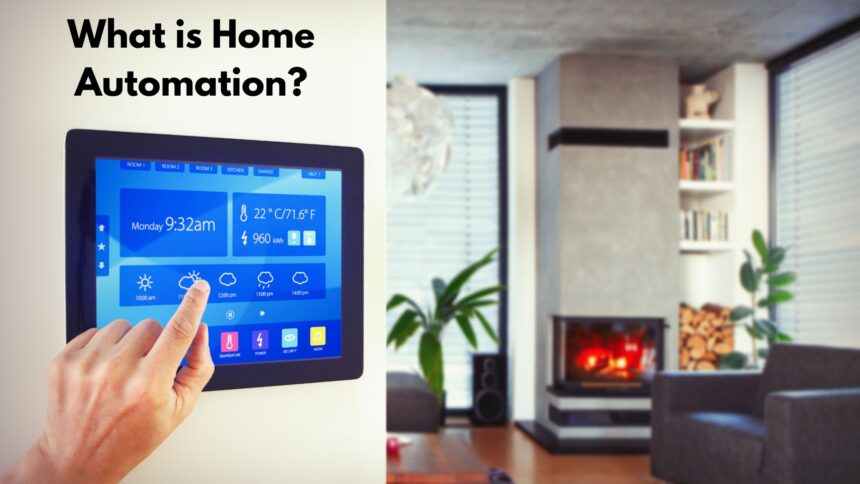What is Home Automation?
Home automation essentially uses technology to create a smart home that anticipates your needs and makes your life easier. It’s about controlling and monitoring devices and appliances in your house remotely or through automated schedules.
Think about it like this: instead of manually flipping light switches or adjusting the thermostat, home automation lets you do it from your phone, even if you’re not home. It can also automate tasks based on your preferences or even integrate with other smart devices to create a more seamless living experience.
How Does Home Automation Work?

Home automation revolves around a network of interconnected devices that can be controlled and monitored remotely. These devices, including smart lights, thermostats, appliances, and security systems, communicate with each other and a central hub, often a smartphone app or a smart speaker like Amazon Echo or Google Home.
Here’s a breakdown of the core components:
- Smart Devices: These are everyday appliances and systems equipped with Wi-Fi or Bluetooth connectivity, allowing for remote control and data exchange.
- Hub: This acts as the central command center, receiving and transmitting signals between smart devices and the user interface.
- User Interface: This can be a smartphone app, a smart speaker, or a dedicated touchscreen panel that allows you to control and monitor your connected devices.
Types of Home Automation
The beauty of home automation: Its versatility is what makes home automation so appealing. Here are some key areas it can transform:
- Lighting Control: Dim the lights for a movie night or program them to turn on at dusk for added security.
- Climate Control: Adjust your thermostat remotely or set schedules to maintain a comfortable temperature throughout the day.
- Security Systems: Receive alerts when doors or windows open, monitor your home with smart cameras, and even remotely lock/unlock doors.
- Entertainment Systems: Stream music or control your TV with voice commands or your smartphone.
- Appliance Management: Turn on the coffee maker on your way to work or preheat the oven from anywhere.
Advantages and Disadvantages of Home Automation
Advantages:
- Convenience: Control your home from anywhere with an internet connection.
- Security: Keep an eye on your home from a distance and discourage break-ins.
- Energy Efficiency: Automate tasks to minimize energy consumption.
- Enhanced Comfort: Create personalized settings for lighting, temperature, and entertainment.
- Improved Accessibility: Home automation can simplify daily tasks for people with disabilities.
Disadvantages:
- Cost: Smart devices and system installation can be expensive.
- Privacy Concerns: Data security is a consideration with internet-connected devices.
- Technical Knowledge: Setting up and managing a smart home system can require some technical know-how.
- Reliance on Technology: A system malfunction or internet outage could disrupt automated functions.
Importance of Home Automation
Beyond convenience, home automation offers significant benefits:
- Increased Safety: Automated security systems deter break-ins and provide real-time monitoring.
- Energy Savings: Smart thermostats and lighting systems can optimize energy use, reducing costs and environmental impact.
- Remote Monitoring: Keep an eye on your home, even when you’re away, for peace of mind.
- Improved Accessibility: Automation can make everyday tasks easier for people with limitations.
Home Automation Applications with Examples

Home automation applications can integrate seamlessly into your daily routine, offering convenience, security, and even energy savings. Here are some examples:
- Lighting Control: Imagine walking into a well-lit house as you approach the door at dusk. Smart lights with occupancy sensors can detect your presence and automatically turn on, while also allowing you to adjust brightness and color temperature through your smartphone or voice commands.
- Climate Control: No more battling over the thermostat! Smart thermostats learn your preferences and adjust the temperature to match. You can also set schedules to ensure a comfortable environment when you’re home and save energy when you’re away.
- Security Systems: Home automation takes security a step further. Smart doorbells with cameras allow you to see who’s at your door even when you’re not home, and smart locks can be controlled remotely, letting you lock or unlock your doors from your phone. Additionally, motion sensors and security cameras can trigger alerts if they detect unusual activity.
- Appliance Management: Simplify your mornings with a coffee maker that starts brewing before you even get out of bed, or preheat your oven from afar for a stress-free dinner prep. Smart appliances can also be integrated with other smart home devices to create routines. For instance, your smart oven can automatically turn on the vent hood when it senses preheating.
- Entertainment Systems: Gone are the days of searching for the remote. With home automation, you can control your TV, sound system, or streaming devices with your voice or smartphone app. dimming the lights, setting the thermostat, and starting a movie—all with just one voice command!
These are just a few examples, and the possibilities for home automation are constantly growing.
Precautions While Using Home Automation

Here are some tips for secure and successful home automation:
- Choose reputable brands: Opt for devices with strong security protocols and a history of addressing vulnerabilities.
- Create strong passwords: Use unique and complex passwords for your smart home system and individual devices.
- Enable two-factor authentication: Enhance your security by requiring a code from your phone along with your password.
- Keep your system updated: Install software updates for your hub and devices to benefit from security patches and bug fixes.
- Secure your Wi-Fi network: Use strong WPA2 encryption for your Wi-Fi network and consider setting up a guest network for untrusted devices.
Home Automation Companies in India

Here are some of the top home automation companies in India:
- Philips Hue: Known for its high-quality and reliable smart lighting solutions, Philips Hue offers a wide range of LED bulbs, light strips, and lamps that can be controlled via your smartphone or voice assistants.
- Schneider Electric: Schneider Electric’s Wiser range provides a user-friendly and scalable home automation system. Their solutions include smart plugs, dimmers, and switches that allow you to control lighting, fans, and appliances remotely.
- Havells Crabtree: A major player in the Indian electrical appliances market, Havells Crabtree’s IntelliCentre system offers a comprehensive home automation solution. You can control lighting, thermostats, security systems, and even curtains through their user interface.
- Legrand: Specializing in building and electrical products, Legrand’s smart home offerings include lighting controls, thermostats, and door entry systems. Their solutions are suitable for both homes and businesses.
- Smartron: An Indian company offering a variety of smart home devices, including smart plugs, bulbs, cameras, and sensors. Their products are recognized for being affordable and user-friendly.
This is not an exhaustive list, but it gives you a good starting point for exploring home automation options in India.
Conclusion: Transforming Your Living Space
Home automation isn’t just about having fancy gadgets; it’s about creating a smarter, more convenient, and efficient living environment. From simplified routines to enhanced security and potential energy savings, home automation offers a multitude of benefits. While there are initial considerations regarding cost, security, and technical setup, the long-term advantages can significantly improve your quality of life. As technology continues to evolve, the possibilities for home automation are limitless. Are you ready to welcome the future of living? Take the first step towards a smarter home today!
FAQ’s of Home Automation
- Is Home automation expensive?
It depends on your needs. Home automation can range in cost depending on your desired level of complexity. Starter kits with a few basic devices can be relatively affordable, while fully automating your entire home will naturally be more expensive. - Is Home automation safe?
Security is a major concern with any internet-connected device. choosing reputable brands with strong security protocols and practising good cyber hygiene habits like using strong passwords and keeping your system updated can significantly reduce the risk. - Do I need a lot of technical knowledge to use home automation?
Many home automation systems are designed to be user-friendly and can be set up and controlled through smartphone apps. However, some systems may require a bit more technical knowledge for installation or configuration. - what happens if my internet goes out?
while an internet outage can disrupt some functionalities, many smart home devices can still operate on pre-programmed schedules or local controls. additionally, some systems offer backup options for critical functions like security cameras.




